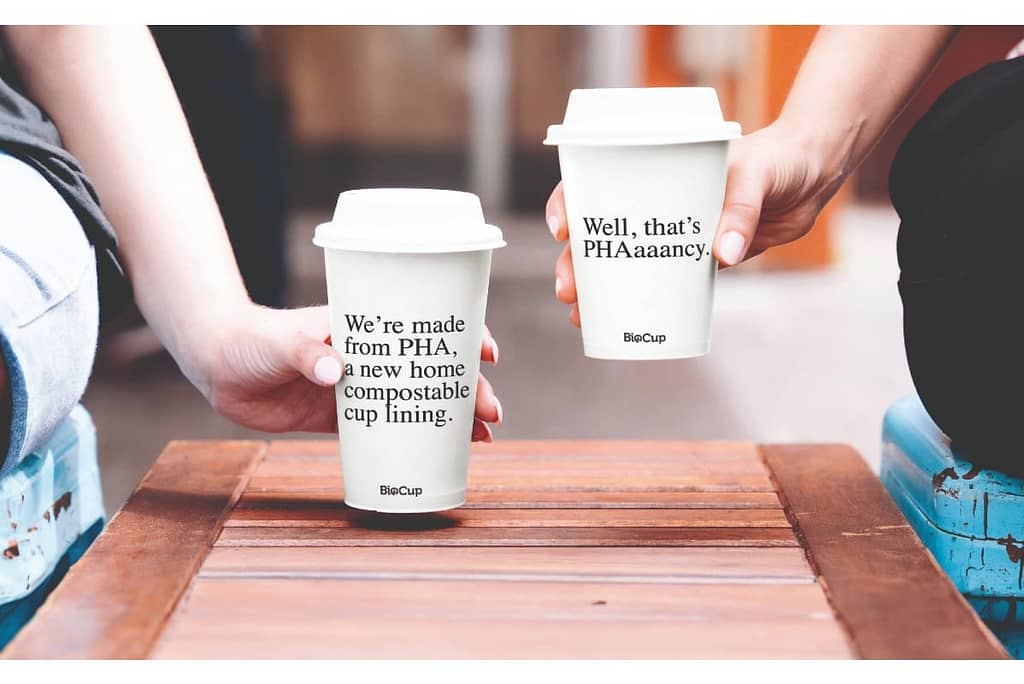[[{“value”:”
BioPak is set to launch a new single-use packaging lining that will revolutionise the home-compostable cup industry.
Australian company BioPak has been at the forefront of the compostable packaging revolution since it was established in 2006. It disrupted the plastic-obsessed single-use market by introducing compostable foodservice packaging made from renewable materials, and became carbon-neutral in 2010 before most businesses had even heard of the term.
Throughout the company’s almost two-decade history, BioPak CEO Gary Smith has been on a mission to ensure his products have the smallest possible impact on the planet. An internal research and development team work alongside industry engineers to continuously develop new materials and technologies, and their latest innovation is set to change the home-compostable game.
“Currently, our single-use coffee cups are lined with PLA (polylactide) bioplastic or a water-based coating [used in the Aqueous range] to keep them watertight. They are both better options than conventional plastic, but each has room for improvement,” says Gary.
PLA is made from plant-based resources such as corn, cassava, and sugarcane. It needs to be relatively thick to function correctly, which means it can’t usually be home composted because a standard domestic compost bin will almost never reach the required temperatures for PLA to break down completely. Therefore, PLA-lined products are only industrially compostable.
The Aqueous cups, on the other hand, uses significantly less material thanks to a much thinner lining. As a result, they can be composted at home and biodegrade within the required time frame (the Australian Standards for home compostability requires compostable plastics to disintegrate after 180 days and completely biodegrade after 12 months). However, unlike PLA which is a bioplastic, the Aqueous lining contains a small amount of synthetic polymer created using fossil fuels. As a brand that strives to create plastic-free alternatives, BioPak wanted to introduce a solution that contained zero fossil fuel-based plastic and was also home compostable.
The company’s push to develop products that users can compost at home stems from the current waste system in Australia. Gary believes there is significant room for improvement in the country’s composting and waste infrastructure, with greater support needed at a federal level to support circular solutions.
“In states like Victoria and New South Wales, there’s currently no easy route to compost packaging industrially as composting facilities don’t accept them due to EPA regulations or capacity issues. We need national change, but in the meantime we want to ensure those who want to compost our products at home are able to do so,” says Gary.
“After years of development we’ve come up with a solution: polyhydroxyalkanoate (PHA). The lining is produced by microbes during the fermentation of renewable resources such as plant sugars and vegetable oils.”
The new material ensures the cups don’t contain fossil fuel-based materials and are certified home compostable.
“The PHA resin biodegrades so quickly that it is certified marine degradable. This is a breakthrough in bioplastics. However, our products are not designed to be disposed of in the marine environment, so it is not a licence to litter,” says Gary.
The new PHA cups are due to launch later this year and will be the first in the Australian market. They’ll initially be available for BioPak’s long-standing partners and then introduced to the wider industry.
“We know there’s going to be a lot of interest in these cups from the café market which has a keen awareness of sustainability,” he says.
For years, BioPak has endeavoured to make it as easy as possible for café owners to introduce sustainable initiatives at their venues. In 2021, it launched Compost Connect, a not-for-profit platform to link foodservice businesses to commercial organic waste pick-up services. There are currently 23 compost partner services covering over 2000 postcodes across Australia and New Zealand. Businesses can find out if they have a local service on the Compost Connect website.
“Our company vision is to disrupt the current take, make, and waste model and provide the tools to create a truly circular economy,” says Gary.
For more information, visit biopak.com/materials/pha
“}]]


